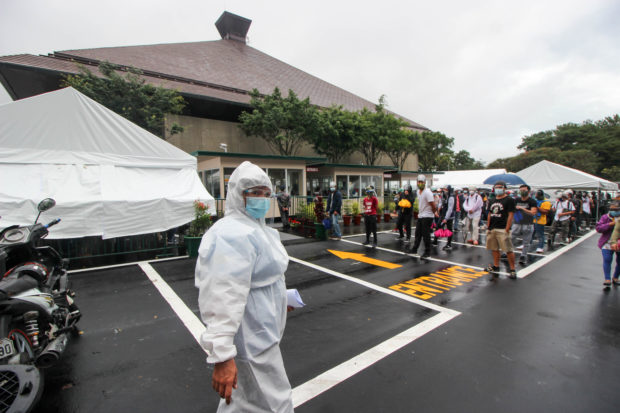Research group classifies 9 LGUs as ‘high-risk’ areas for COVID-19

COVID TESTING. High risk individuals, frontliners, and the most vulnerable undergo swab testing at Baguio City’s newly opened centralized triage system at the Baguio Convention Center in September 2020. The national government sponsored testing targets to test at least 3,000 individuals in a span of 3-days.
Photo: Contributed by Jean Nicole Paus
MANILA, Philippines — The group OCTA Research has classified nine local government units (LGUs) in the country as high-risk areas for the coronavirus disease 2019, with Baguio City and Davao City being tagged as “hotspots of serious concern.”
Based on the monitoring report of OCTA Research dated Monday but released to the media on Tuesday, the following LGUs were classified as high-risk:
Metro Manila
- Makati
Rest of Luzon
- Baguio City, Benguet
- La Trinidad, Benguet
- Itogon, Benguet
- Batangas City, Batangas
- Lucena, Quezon
- Lopez, Quezon
Mindanao
- Davao City, Davao del Sur
- Pagadian, Zamboanga del Sur
No area in Visayas was tagged as high-risk by the research group.
OCTA Research lists LGUs of concern or high-risk areas based on high cases per day, high positivity rate, high attack rate, and/or high hospital occupancy.
“We are concerned that these LGUs may experience high hospital burden in the coming weeks that may stress their health care systems and overwhelm their medical front-liners,” the group said in its report.
Meanwhile, OCTA Research said Baguio City and Davao City are considered “LGUs hotspots of serious concern” given the significant surge in COVID-19 cases in these areas.
The group urged concerned LGUs to further intensity their efforts in testing, contact tracing, and isolation to reverse the increase in transmission of the virus in their communities.
“Furthermore, in the high-risk LGUs, the implementation of more aggressive and effective localized lockdowns with stricter border control is urgently needed to suppress further viral transmissions,” the research team added.
OCTA Research is an independent and interdisciplinary research group composed primarily of faculty members and alumni from the University of the Philippines. Contributors from the University of Santo Tomas and Providence College in the United States are also part of its team.
JPV
For more news about the novel coronavirus click here.
What you need to know about Coronavirus.
For more information on COVID-19, call the DOH Hotline: (02) 86517800 local 1149/1150.
The Inquirer Foundation supports our healthcare frontliners and is still accepting cash donations to be deposited at Banco de Oro (BDO) current account #007960018860 or donate through PayMaya using this link.